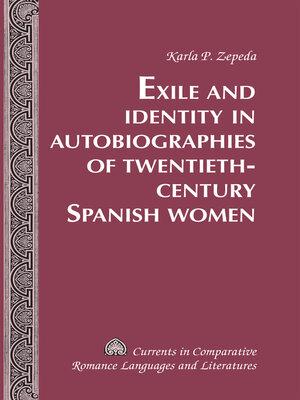Exile and Identity in Autobiographies of Twentieth-Century Spanish Women
ebook ∣ Currents In Comparative Romance Languages and Literatures
By Tamara Alvarez-Detrell

Sign up to save your library
With an OverDrive account, you can save your favorite libraries for at-a-glance information about availability. Find out more about OverDrive accounts.
Find this title in Libby, the library reading app by OverDrive.



Search for a digital library with this title
Title found at these libraries:
| Library Name | Distance |
|---|---|
| Loading... |
In Exile and Identity in Autobiographies of Twentieth-Century Spanish Women, Karla P. Zepeda studies the experience of exile and its effects on identity in three autobiographies: In Place of Splendor by Constancia de la Mora, Memoria de la melancolía by María Teresa León, and Seis años de mi vida by Federica Montseny. These three prominent Spanish women of the Second Republic became exiles at the conclusion of the Spanish Civil War due to the onset of the Francisco Franco regime. The political expatriation caused their relocation into various countries: the United States, France, Argentina, and Italy. The repositioning initiated a process of self-reinvention, as the women come in contact with social circumstances prompting new versions of self. Through their works, these women negotiate their identity in relation to the lost homeland and the new locale. Exile and Identity in Autobiographies of Twentieth-Century Spanish Women examines the diverse character of diaspora, the social transactions deployed in a variety of circumstances, and the self-negotiations elicited in social interactions. Identity proves to be an intentional re-creation of self, enacted in particular circumstances, and negotiated as a response to social conditions.







